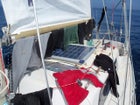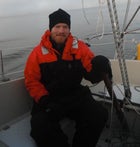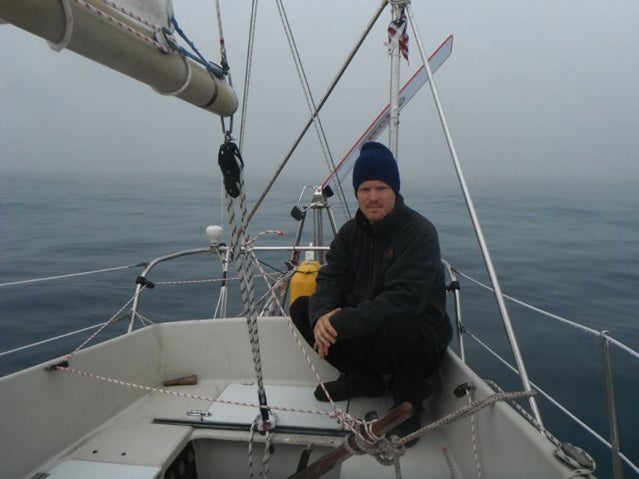Last June, set out to become the first person ever to circumnavigate North and South America by sailboat, non-stop and solo. Expeditions of this scale often require major corporate backing and take years to plan, but Rutherford, who was raised in Ohio and is a veteran of a trans-Atlantic sailing expedition and a bicycle trek across Southeast Asia, collected money and organized the voyage largely by himself. (He is also fundraising for for , an organization that provides sailing opportunities for the disabled.) Rutherford lived on his boat for 11 months as he prepared to sail, enduring a Maryland winter without heat and eating Ramen noodles to save money. On June 13, 2011, he set sail from Annapolis. Nine months, two broken GPS units, one confrontation with drunken fishermen, and more than 24,000 miles later, he is north of Puerto Rico, on a track to make landfall in mid-April.
Drying clothes on the St. Brendan
 Drying clothes on the St. Brendan
Drying clothes on the St. BrendanRutherford in August
 Rutherford in August
Rutherford in AugustAn iceberg in the Northwest Passage
 An iceberg in the Northwest Passage
An iceberg in the Northwest PassageWhy are you doing this?
I had wanted to do the Northwest Passage for five or six years. It’s been a long-term goal. When I sailed single-handed from Annapolis to Europe, Africa, and the Caribbean, and then back, I kept talking about doing the Northwest Passage and people kind of laughed at me. Some of the legends of sailing have done these long, single-handed trips out on the oceans, so I decided to do a non-stop, solo, circumnavigation of the Americas, which has never been done before.
How do you pack for a year at sea?
I brought a year’s supply of Shelf Reliance freeze-dried food and I have a manual water maker that I pump to make water. I had to fill every empty spot of the boat with cans of food, 750 pounds worth, in order to get it all on board. If I’m lucky, I catch a fish. I lost about 30 pounds in the Arctic but I gained most of that back in the Pacific.
What’s a typical day at sea like for you?
I wake up at first light. I pump the water maker for about a half-hour to make coffee. If the weather is nice, I try to work on the boat. Things are always breaking. Some days I don’t do much.
How does your boat compare to boats that other sailors have used for these types of voyages?
For such a long trip, usually the boat would be worth between $200,000 and $600,000. The last circumnavigation of the Americas was done in a boat worth close to a million, and it wasn’t non-stop or single-handed. This boat, the St. Brendan, is worth between $10,000 and $12,000.
A said that everything on your boat was broken, rotted through, or water-logged. Is that right?
The Arctic fog destroyed many, many things. The ocean is rough on everything.
You wrote on your blog that all your books were ruined. How are you passing the time? My Kindle broke, too, but I have about 10 books on my iPod touch. I’ve read most of them a few times. I’m still working on The Decline and Fall of the Roman Empire, which is around 18 volumes long, like 2,000 pages. It’s a slow read.
Do you ever feel like you’re going crazy?
I’m not sure if I was sane when I left.
What’s been the low point of the trip so far?
Getting knocked down in the Bering Sea was rough. The boat was damned-near upside down. But there haven’t really been too many low points. I miss having real conversations, where you can look at the person you’re talking to. Or being able to lie down and get a real night’s sleep. I’m always waking up during the night to check for freighters and check my course. I never truly sleep.
In February, you : “I try not to think much about land. I wish land didn’t exist, as if that would make all my negative thoughts go away.”
This is my niche. Life is easier at sea. Your problems become very basic and are based on survival, not drama. I am starting to look forward to land but land is also where the problems live.
You mentioned that you don’t have a girlfriend and that your family situation is complicated. Do you know who will be there in Annapolis to greet you?
I don’t know. My contact with people back home is minimal, calls on the satellite phone are expensive, and I’m in a bad situation with power. Maybe my dad will show up, but he lives in Arizona, so I don’t know. I’ll be fine as long as one person shows up with a six-pack of Guinness. After being alone so long, the idea of seeing a lot of people is intimidating.
So what will life be like for you when you return home?
I’ll be broke. When I get back I plan to make a few deliveries—I’ll bring some boats up from the Caribbean. Then hopefully I’ll have enough money to live on my boat, on anchor, which is free, and try to live off the savings I get from the deliveries to have two to three months to write a book. I’ve been traveling, one trip after another, for 10 years now. I’m not sure what the future holds. I try not to think about it.


